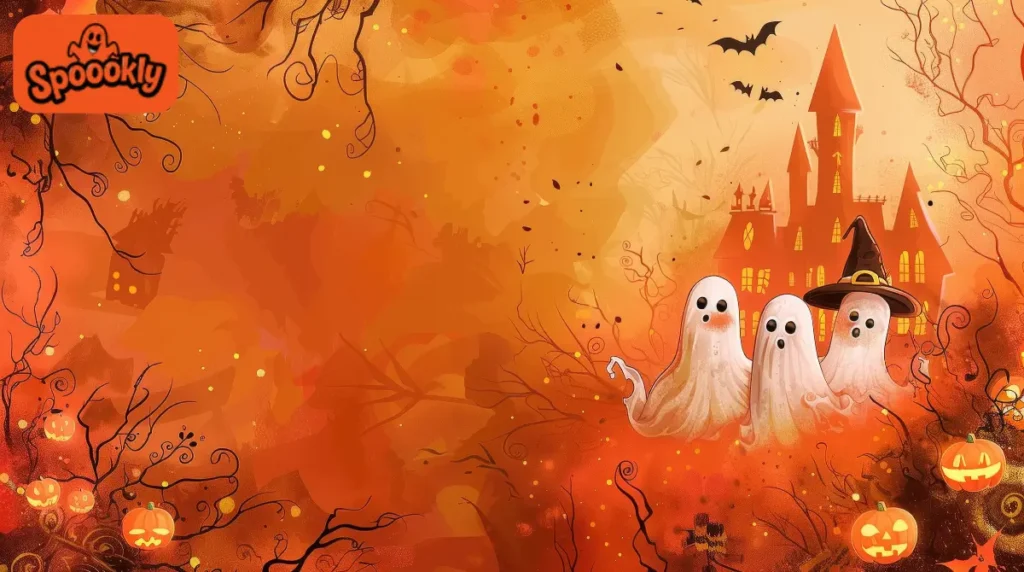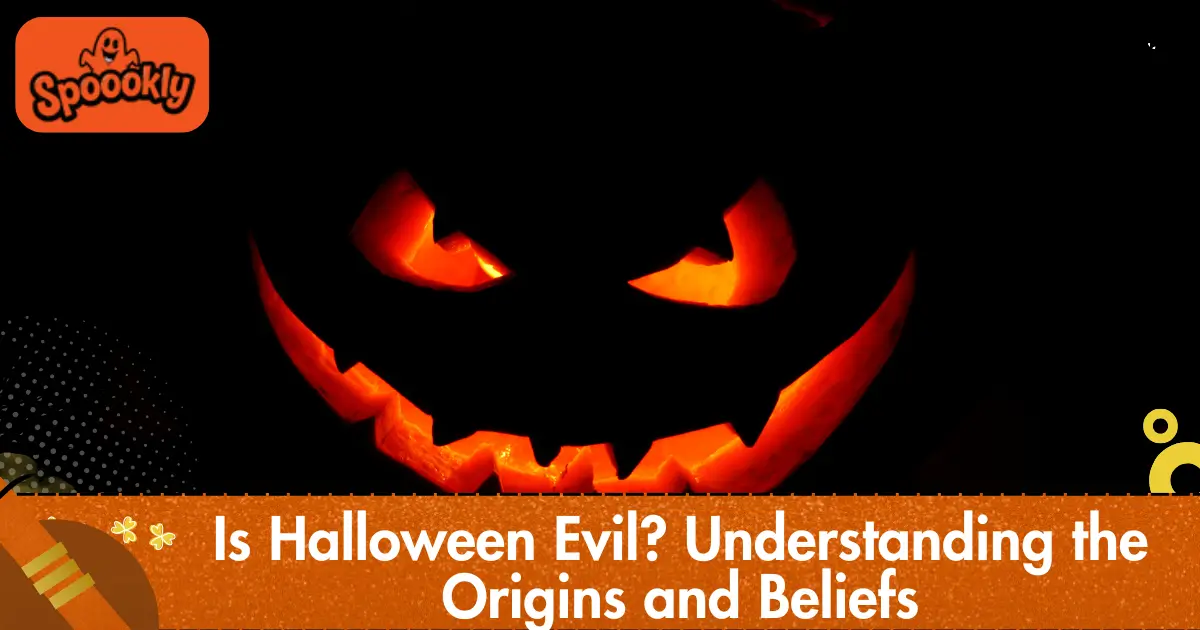Every year, I hear two very different opinions. Some people swear Halloween is a doorway to evil, while others say it’s just harmless fun with candy and costumes.
So, is Halloween really evil, or is that just an old myth kept alive by spooky stories? That’s the question I’ll try to answer in this article.
Halloween today looks like a mix of costumes, pumpkins, haunted houses, and trick-or-treating.
But when someone asks if it’s evil, the real question is: evil in what way? Do they mean spiritually, morally, religiously, or culturally? To get real answers, we need to go back to where it all started.
Historical and Cultural Origins of Halloween
1. The Celtic Festival of Samhain
Halloween’s roots go back over 2,000 years to the ancient Celtic festival called Samhain. This was celebrated at the end of the harvest season, usually on October 31.
The Celts believed this was the night when the boundary between the living and the spirit world became thin.
Bonfires were lit to keep away wandering spirits, and people wore disguises to avoid being recognized by supernatural beings. For the Celts, it wasn’t about “evil” but about respect, fear, and survival during the dark winter months.
2. Pre-Christian Beliefs and Rituals
During Samhain, the Celts honored their gods, prepared food offerings, and believed in the “Otherworld.” They thought spirits of ancestors returned on this night.
Key traditions included:
- Bonfires to scare away harmful spirits.
- Costumes and masks to confuse wandering souls.
- Harvest rituals to thank the gods for crops and pray for protection in winter.
For them, these were practical rituals tied to survival, not satanic or evil acts.
3. Christian Adaptation and Transformation
When Christianity spread into Celtic lands, church leaders didn’t erase Samhain. Instead, they reshaped it. The church established All Saints’ Day (November 1) and All Souls’ Day (November 2).
October 31 became All Hallows’ Eve, which later shortened to “Halloween.” This blending allowed people to keep some of their traditions but under a Christian framework.
A timeline helps show this transformation:
| Period | Event | Influence on Halloween |
|---|---|---|
| Pre-1st century | Celtic Samhain | Spirits, harvest, bonfires |
| 8th century | Pope Gregory III creates All Saints’ Day | Christian adaptation |
| 10th century | All Souls’ Day added | Focus on remembering the dead |
| Middle Ages | “Souling” and prayers for the dead | Early trick-or-treat traditions |
| 19th–20th century | Migration to America | Blending into modern Halloween |
4. From Solemn Rituals to Social Fun
By the 1800s, Halloween had shifted from religious or spiritual meaning to a community celebration. Immigrants in the United States brought their customs, mixing Celtic, Christian, and cultural practices.
Costumes became playful instead of protective. Pumpkins replaced turnips for carving lanterns. Trick-or-treating became popular in the 20th century as a safe way for kids to celebrate.
Today, most people see Halloween as a cultural event. It’s more about candy, decorations, and social fun than spiritual danger.

Is Halloween Evil? Religious and Ethical Perspectives
1. Christianity and Halloween
I grew up hearing two very different voices within Christianity about Halloween.
Arguments that Halloween is evil:
Some Christians argue that Halloween promotes the occult and glorifies darkness. They point to its roots in pagan rituals, the focus on spirits, and the rise of horror themes in modern culture.
Ministries such as GotQuestions.org and Focus on the Family highlight concerns like:
- Costumes that mimic demons or witches.
- Activities that can normalize evil or fear.
- The danger of mixing faith with practices tied to superstition.
From this view, Halloween isn’t harmless fun it’s a celebration that compromises moral and spiritual values.
Arguments that Halloween is neutral or acceptable:
Other Christians see Halloween as a cultural event, not a spiritual danger. They argue that traditions lose their original meaning over time. Pumpkins, costumes, and candy aren’t inherently evil.
Parents who want to participate can guide their kids toward safe, wholesome fun, like dressing up as superheroes or hosting family parties.
Some churches even host “Fall Festivals” as alternatives, focusing on community while avoiding darker themes.
2. Islam and Halloween
Muslim scholars often take a cautious stance toward Halloween. In Islam, religious festivals are considered acts of worship, and celebrating non-Muslim festivals is sometimes discouraged. The concerns are usually about:
- Imitating non-Islamic practices that may conflict with Islamic teachings.
- Origins in pagan rituals, which some scholars say Muslims should avoid.
- Activities linked with superstition or fear, which do not align with Islamic principles of faith and guidance.
However, in multicultural societies, some Muslim families participate in small wayslike letting kids enjoy candy or wear fun costumes without embracing spiritual elements. It often comes down to personal interpretation and cultural context.
3. Judaism, Hinduism, and Other Views
Judaism does not have a strong traditional stance against Halloween, but some Jewish families avoid it due to its Christian and pagan roots. Others treat it simply as a secular, cultural event.
In Hindu culture, Halloween is not part of religious practice, but there are similar festivals of light, spirits, and remembrance such as Diwali or Pitru Paksha.
These show that many cultures around the world engage with themes of death, ancestors, and the supernatural.
From a secular viewpoint, Halloween is simply a festival. It’s about creativity, costumes, and community bonding. For most non-religious people, it’s no more “evil” than New Year’s Eve parties or Valentine’s Day.
Ethical, Spiritual, and Psychological Considerations
1. The Psychology of Fear and Darkness
Why do people love scary holidays? Psychologists say fear triggers adrenaline, which makes us feel alive. Haunted houses and horror movies let us experience danger in a safe setting.
But constant exposure to dark themes can also desensitize us. Kids may find fear fun, but too much exposure to violent or graphic themes could normalize unhealthy ideas.
2. Moral Lessons of Halloween
Halloween is not automatically harmful, but it can become so depending on how it’s celebrated. Issues arise when:
- Costumes become overly sexualized for kids or teens.
- Parties encourage reckless behavior.
- Peer pressure pushes children into activities that feel unsafe.
Handled wisely, Halloween can teach creativity, community, and sharing. Handled poorly, it can promote questionable values.
3. Spiritual Concerns
Some faith groups see Halloween as spiritually risky because it plays with symbols of death, spirits, and the occult.
Even if most people treat it as harmless, the symbols themselves witches, demons, skeletons can carry deeper meanings in certain traditions.
On the other hand, many argue that symbols change over time. A kid in a skeleton costume today isn’t calling on spirits; they’re just wearing something spooky for candy. The meaning lies in intention.
Arguments and Counterarguments
Arguments for Halloween Being Evil
- Occult Origins: Halloween grew from Samhain, which included rituals tied to spirits and the dead.
- Association with Evil: Costumes and decorations often highlight demons, witches, or dark forces.
- Moral Decline: Some believe it encourages destructive behavior, inappropriate costumes, or glorification of fear.
Arguments Against Halloween Being Evil
- Symbols Lose Meaning: Just like Easter eggs no longer symbolize fertility gods, jack-o’-lanterns no longer carry ancient spirit-warding power.
- Cultural, Not Religious: In most modern settings, Halloween is secular and playful.
- Community Value: Trick-or-treating and parties bring neighbors together, spark creativity, and create safe family fun.
Is Halloween Evil Today?
When I look at Halloween as it exists today, most of it feels cultural rather than spiritual. Costumes are playful, candy is central, and community events take the spotlight. But I also understand why some people still see shadows of its past.
If you measure Halloween by its Celtic origins, yes it had connections to spirits and rituals. If you measure it by today’s neighborhood trick-or-treating, it’s about kids in Spider-Man suits collecting candy. The truth is somewhere in between.
The “evil” label depends on perspective:
- For strict religious groups: Halloween retains elements of the occult.
- For most families: It’s harmless entertainment.
- For culture watchers: It’s a blend of folklore, commerce, and creativity.
How to Celebrate Without Concern?
If you want to enjoy Halloween but avoid the darker edges, there are simple ways to adapt:
Safer Approaches
- Focus on fun costumes like superheroes, animals, or storybook characters.
- Take kids to community events hosted by schools, malls, or churches.
- Skip horror themes and emphasize light, laughter, and creativity.
Alternatives
- Host a Harvest Festival with pumpkin carving, apple bobbing, and games.
- Celebrate a Light Party, highlighting positivity instead of fear.
- Use the night for family time, sharing treats, stories, or a movie.
By reframing the celebration, you can keep the community spirit without stepping into anything that feels spiritually risky.
Conclusion
Halloween has walked a long path from Celtic rituals to church traditions to neighborhood trick-or-treat. Calling it “evil” oversimplifies its history and modern form.
Today, Halloween can be whatever you make it. If your faith says avoid it, that’s valid. If you see it as cultural fun, that’s valid too. For me, it’s about choice, awareness, and respect.
So, is Halloween evil? Not inherently. It carries echoes of its past, but in practice, it’s mostly candy, costumes, and community.
The best approach is to understand its history, recognize your beliefs, and celebrate (or not) in a way that feels right for you.
FAQs
No. While its ancient origins involved spirits, modern Halloween is largely cultural. Satanism is not the foundation of Halloween.
Yes, but it depends on interpretation. Some choose not to. Others celebrate in ways that align with their values.
Most don’t. For the majority, it’s about fun, candy, and costumes not belief in spirits.
No. Candy is candy. Concerns lie more in moderation and health than in spirituality.
Both texts warn against superstition and relying on spirits. Faith is placed in God, not in rituals of fear. Neither specifically mentions Halloween.

